DCPA NEWS CENTER
Enjoy the best stories and perspectives from the theatre world today.
Enjoy the best stories and perspectives from the theatre world today.
It’s been 25 years since Jerry Lewis, appearing in Aspen at the U.S. Comedy Arts Festival, made headlines with his statement that women aren’t funny. “I, as a viewer, have trouble with it,” he said at the time. “I think of her as a producing machine that brings babies in the world.”
Revenge is a dish best served pregnant, as comedian Ali Wong demonstrated with her acclaimed 2016 special, “Baby Cobra,” – recorded while seven months pregnant. Jerry Lewis wasn’t the first to dismiss women as comedians; he just made the mistake of saying so in the 21st century. Women comedians have been busting through the glass ceiling in a myriad ways for nearly a century.
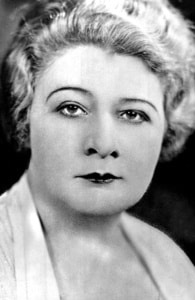
Sophie Tucker
Sophie Tucker
By 1906, when she was just 20 years old, Sophie Tucker had left her first husband and was finding her way toward a career in performance. She created an indelible persona as a lusty, proudly Jewish singer and comedian in recordings, vaudeville, radio, and television. She made classics out of the songs “Some of These Days” and “My Yiddishe Momme,” and once said she was proudest when she was welcomed to London in 1922 with a sign reading, “Welcome Sophie Tucker, America’s Foremost Jewish Actress.” Today she is best remembered, along with singers such as Bessie Smith and Lucille Bogan, for her sexually daring work, which embraced her round figure and titillated listeners.
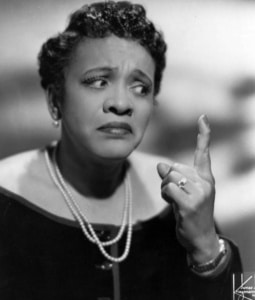
Moms Mabley
Moms Mabley
Born in 1897, the future Moms Mabley (born Loretta Aiken) ran away at the age of 14 to join a minstrel show and quickly made herself a star of the Chitlin’ Circuit, a vaudeville system of Black entertainers during the Jim Crow era. In 1921, she came out as a lesbian, making her a pioneer for gay performers as well as women. In 1930, she became the first woman comic to perform at the Apollo Theater. It wasn’t until the 1950s that “Jackie Mabley” took on the name Moms, smiling a toothless grin in a house dress and floppy hat. The goofy appearance let her take on serious topics including racism and sexuality. Offstage, she preferred menswear. It wasn’t until the 1960s that she became widely popular with white audiences, performing at Carnegie Hall and frequently on “The Smothers Brothers Comedy Hour.”
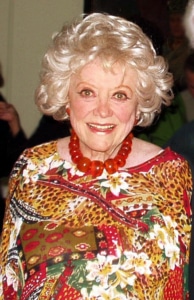
Phyllis Diller
Phyllis Diller
Phyllis Diller continued the impact of Sophie Tucker by making self-mockery the cornerstone of her act, eviscerating her own appearance and domesticity in general with a machine-gun spray of one-liners. She was aggressive and bold in a way women had not yet been in comedy, and demanded space in what was decidedly a men’s club. In 1983 – five years before the club admitted its first female member, Liza Minelli – Diller crashed the Friars Club roast of Sid Caesar by going in drag as Phillip Downey. Two years later, the club gave her her own roast.
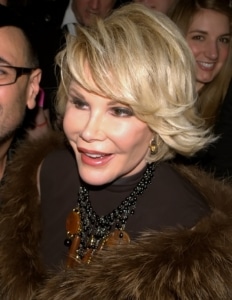
Joan Rivers
Joan Rivers
Sixteen years younger than Diller, Rivers also made her way in comedy through self-deprecating humor. She came up in the 1960s Greenwich Village scene with George Carlin, Richard Pryor, and Woody Allen. Rivers considered her big break to be an appearance on “The Tonight Show” with Johnny Carson in 1965 (she had previously performed on the show for Jack Paar). Carson became a close friend, bringing her back repeatedly and using her as the show’s first permanent guest host, beginning in 1983. Their friendship ended in 1986, when Rivers became the first woman to host a talk show, “The Late Show Starring Joan Rivers.” Today’s popular culture continues to pay homage to Rivers through characters inspired by her, including “The Marvelous Mrs. Maisel” and Deborah Vance on “Hacks.”
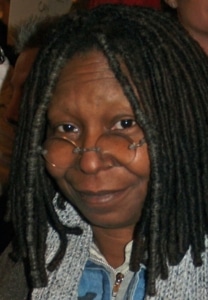
Whoopi Goldberg
Whoopi Goldberg
Today’s audiences know Whoopi Goldberg best as the plainspoken stalwart of “The View” and star of movies such as Sister Act, but this EGOT (winner of the Emmy, Grammy, Oscar, and Tony awards) broke through with her one-woman show in which she portrayed Moms Mabley. Her reputation as a trailblazer stems from her 1983 Spook Show, which transferred to Broadway as Whoopi Goldberg. In it, she performed a wide range of monologues, bringing to life characters seldom seen in comedy or drama.
